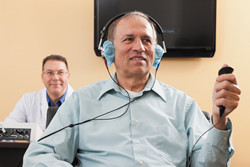
5 timeless habits for better health

What are the symptoms of prostate cancer?

Is your breakfast cereal healthy?

When pain signals an emergency: Symptoms you should never ignore

Does exercise give you energy?

Acupuncture for pain relief: How it works and what to expect

How to avoid jet lag: Tips for staying alert when you travel

Biofeedback therapy: How it works and how it can help relieve pain

Best vitamins and minerals for energy

Should you take probiotics with antibiotics?
Hearing Loss Archive
Articles
Choking alert: Strategies for safe swallowing
Therapy, exercises, and changes in eating habits will help keep you safe.
Image: nyul/ iStock
It used to be so easy to munch a handful of nuts: chew, swallow, enjoy. Now, you avoid them or make sure there's a glass of water nearby when you eat nuts or any other foods that seem to get stuck in your throat. "It's normal to have some age-related changes with swallowing or occasional difficulty swallowing. What's not normal is when food or liquids get into the lungs regularly," says Semra Koymen, a speech-language pathologist at Harvard-affiliated Brigham and Women's Hospital.
Causes and symptoms
Diagnosis
A speech pathologist's evaluation of dysphagia includes an exam of your mouth and tongue, consideration of your medical history and symptoms, and most likely a test in the radiology department called a video swallow study. It's done using a fluoroscopean x-ray machine that takes moving pictures. You swallow a variety of liquids and foods mixed with barium, a substance that shows up on x-rays. "As you swallow, we can see the material move through the mouth and throat and into the esophagus," says Koymen.
Treatment
Irrigation better than steam in relieving nasal symptoms
Nasal irrigation using a neti pot was more effective than inhaling steam in relieving chronic sinus symptoms in a large randomized study.
Trouble swallowing your medication? These tricks might help
Some simple techniques can make big pills go down more easily.
Image: Thinkstock
If you have trouble swallowing a pill, you're in the majority. In a Harris survey conducted a few years ago, 51% of women said they had experienced difficulty swallowing tablets or capsules. "We often see people who can swallow food and liquid just fine, but have difficulty with pills," says Denise Ambrosi, director of the Speech-Language Pathology Department at Harvard-affiliated Spaulding Rehabilitation Hospital. Ambrosi notes that some people have physical issues that affect their ability to swallow, while others have an aversion to taking pills.
How swallowing can go awry
Helping the medicine go down
If pills present your only swallowing issues, there are a few things you can do to make swallowing medicine a little easier:
Tuck your head. The following may help even a large pill go down: Put the pill on your tongue. Take a sip of water and hold it in your mouth. Lower your chin to your chest. Swallow.
Disguise the pill. Put it in a food that can be swallowed without chewing, such as applesauce, yogurt, or a fruit or vegetable puree.
Modify the pill. Check with your pharmacist to see if the pill can be ground or broken into smaller pieces that can be mixed into food or more easily swallowed. If a pill is scored, it can probably be divided. However, coated, time-release, and combination medications are meant to be taken whole. So are capsules.
Try a different form. Talk to your doctor to see if you can take the medication (or a related one) in another form, such as a syrup, cream, injection, or infusion. For example, for women who have difficulty swallowing bisphosphonates like alendronate (Fosamax) and ibandronate (Boniva), zoledronate (Reclast, Zometa), is available as intravenous infusion.
How to work around a minor hearing loss
If you're missing a few words but not ready for a hearing aid, a few simple strategies and smartphone apps may help.
Image: iStock
Are you avoiding certain restaurants because they're too noisy? Do you catch yourself wondering what you just heard the radio announcer say? Are you wearing out the volume control on your remote? Chances are you have a bit of hearing loss.
It's easy to ignore a hearing loss because it can be subtle and gradual. And you may be in denial because you don't like the idea of wearing hearing aids. Yet struggling to hear can erode your quality of life.
Does hearing loss boost death risk?
News briefs
A recent study suggests that the more hearing impairment you have, the more your health may be at risk. A study published online Sept. 24, 2015, by JAMA Otolaryngology–Head & Neck Surgery found that mild hearing impairment was linked with a 21% increased risk of death, and moderate-to-severe hearing impairment was linked with a 39% increased risk of death, compared with people who did not have hearing loss. Researchers combed through large surveys of about 1,700 adults ages 70 or older who had undergone hearing tests and adjusted the results for heart disease and other risk factors. "The findings do not indicate that hearing loss causes an increase in mortality, or that hearing aids might reduce that risk. Instead, age-related hearing loss reflects accumulated stresses and damage of a lifetime, so perhaps we should not be surprised that hearing loss is not the only health impact of those stresses," says Dr. Steven Rauch, an ear, nose and throat specialist and the medical director of the Harvard-affiliated Massachusetts Eye and Ear Balance and Vestibular Center.
What you can do for dizzy spells
When you sense the ground spinning under your feet, it could be vertigo. But there may be a simple remedy.
An episode of dizziness is one of the things most likely to drive you to the doctor—and for good reason. The sense that you're literally losing your footing can be terrifying.
Is that noise pollution, or are you hard of hearing?
|
A loss of volume and clarity can interfere with your ability to understand conversations.
Ringing in the ears: Get it checked
Men with tinnitus should get a comprehensive hearing exam, with education on therapy options. Image: Thinkstock |
Tinnitus can't be cured, but find out about proven treatments for persistent and bothersome sounds.

5 timeless habits for better health

What are the symptoms of prostate cancer?

Is your breakfast cereal healthy?

When pain signals an emergency: Symptoms you should never ignore

Does exercise give you energy?

Acupuncture for pain relief: How it works and what to expect

How to avoid jet lag: Tips for staying alert when you travel

Biofeedback therapy: How it works and how it can help relieve pain

Best vitamins and minerals for energy

Should you take probiotics with antibiotics?
Free Healthbeat Signup
Get the latest in health news delivered to your inbox!
Sign Up






